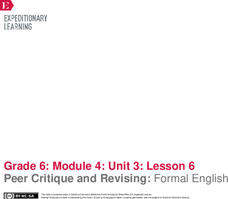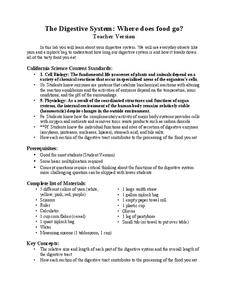EngageNY
Peer Critique and Revising: Formal English
Dear Sir or Madam: What's the difference between formal and informal language? Scholars focus on using formal English and transitions in their position papers. After revising their rough drafts, they engage in the peer editing process...
EngageNY
Narratives as Theater, Part I: What is Readers Theater?
Discover the exciting world of readers theater! Scholars learn all about the reading strategy, reading a script about American heroes and completing an I Notice/I Wonder chart. Next, pupils participate in readers theater using the...
Texas Education Agency (TEA)
Managerial Communications
Communication is key. Pupils receive direct instruction about managerial communications and then independently research communications careers. Scholars then complete exit tickets, answering questions about what they learned.
Texas Education Agency (TEA)
Managers and Cultural Diversity
Let's get down to business. Pupils read a variety of business scenarios and identify appropriate managerial styles for each conflict. Additionally, scholars create a cultural diversity word collage.
Texas Education Agency (TEA)
Advertising, Special Events and Promotion
What a bargain! Scholars learn how to increase business profits with special events and promotions. Using what they learned, pupils create a special event for their school and give an oral presentation to explain their promotional...
Texas Education Agency (TEA)
Career Portfolio
Climb the career ladder! Using a guiding resource, pupils develop an individual career plan including goals, a resume, and self-assessments. Additionally, scholars write a cover letter to a company of choice.
EngageNY
Final Performance Task: Critique and Revision, Part I
Let's work together! Scholars engage in the peer editing protocol, giving and receiving feedback on their draft opinion speeches. They then use classmates' feedback to begin working on their revisions.
Curated OER
Candlemaking
There might not be a butcher or baker, but you'll have a class full of candlestick makers after a hands-on lesson about candles make from beeswax. After a brief history of where beeswax comes from, young artisans craft their own...
Learning to Give
The Beginning of the Storm
Introduce readers to Mildred Taylor's Roll of Thunder, Hear My Cry with a lesson that sets the context for the novel. Class members research the bigotry in Mississippi during the Great Depression and identify examples in the story of how...
Benjamin Franklin Tercentenary
Let’s Throw an Electric Science Party!
Are you looking for a shockingly good lesson? Check out one that has middle schoolers recreate four of Benjamin Franklin's experiments. Groups investigate, observe, and draw conclusions about static electricity and electrical current....
Starry Night Education
Comets and Meteors
Comets are also known as dirty snowballs or icy mud balls. With your super scientists, create a model comet nucleus to discover how they are made and take part in a scientific discussion to learn how it behaves.
Federal Reserve Bank
Expense Tracking
Where does all your money go? Individuals keep a record of the money they spend over the course of 30 days. They then categorize where they are spending their money and write an essay detailing their findings.
Federal Reserve Bank
Financial Goals
Do you have financial goals? How will you make them happen? Help your pupils answer these questions through this interactive project. They create goals and a plan for reaching them as one of many high school algebra projects.
Chicago Botanic Garden
Are All Plants Created Equal?
Photosynthesis requires energy and produces food, and cellular respiration produces energy and requires food. An interesting lesson analyzes the factors that affect the rates of photosynthesis and respiration. Classes spend one day...
LABScI
The Digestive System: Where Does Food Go?
Would you believe that your digestive system stretches to five times your height?! Help your pupils to understand this relationship as they work through the laboratory exercise. The first instructional activity of a 12-part series is a...
PBS
Stories of Painkiller Addiction: Contemplating Nature vs. Nurture
Does having an addict in your family make it more likely to become one yourself? Explore the genetic risk factors, as well as the prominent environmental influences, for substance addiction in a lesson that encourages awareness and open...
Chandler Unified School District
Art Masterpiece: Leonardo’s Inventions—Leonardo da Vinci
Leonardo da Vinci is the focus of a hands-on activity that encourages scholars to become inventors. Pupils brainstorm and sketch their idea, compose a detailed depiction using a mirror writing technique, and antique the paper for a...
US Institute of Peace
Identifying Your Conflict Style
How do you handle conflict? Individuals look inward to determine their own conflict style through group discussion and a short quiz. The sixth installment in a series of 15 conflict management lessons examines how our feelings and...
WE Charity
High School–Module 2: Circular Economy and Nature
Everyone's heard the popular slogan reduce, reuse, recycle, but there may be a better way to talk about sustainability. Using the second lesson from the five-part WE Are Innovators—High School Modules series, learners explore issues...
Serendip
Soap Opera Genetics – Genetics to Resolve Family Arguments
Did she cheat on her husband? Did the hospital switch the babies? Should they have children? As much as this sounds like the plot for a soap opera, all of these questions fit into a single lesson on genetics. Scholars read about three...
Center for Advanced Research on Language Acquisition (CARLA)
Bringing the Biodiversity of Ecuador to Spanish Immersion Classrooms
Designed for the Spanish Immersion classroom, scholars take a look at biodiversity and Ecuador; all the while, practicing their Spanish with a focus on verbs. In small groups, learners examine photographs of the different climate regions...
Pace University
Urban Communities
Urban communities are the focus of a series of lessons created to meet specific needs using differentiated instruction. A pre-assessment designates scholars into three groups based on their ability level. Small groups take part in...
National Woman's History Museum
Women of Wonder: Who Do I Admire?
Celebrate superwomen during Women's History Month with a lesson that showcases a variety of female role models. Following a whole-class discussion on superheroes, role models, respect, and admiration, scholars listen to several...
Encyclopedia Britannica
Get out the Vote Campaign
While some of your students may be too young to vote, they can get involved in the election process by creating a nonpartisan campaign encouraging voter registration. After researching how to register to vote, class members design PSAs,...
Other popular searches
- Environment Volunteering
- Volunteering Italy
- Volunteering and Giving
- Kids Volunteering
- Volunteering Lesson Plans
- Economics Volunteering
- Volunteering Worksheets
- Volunteering for War
- Volunteering for a Job
- Volunteering Third Grade
- Volunteering in the Community























